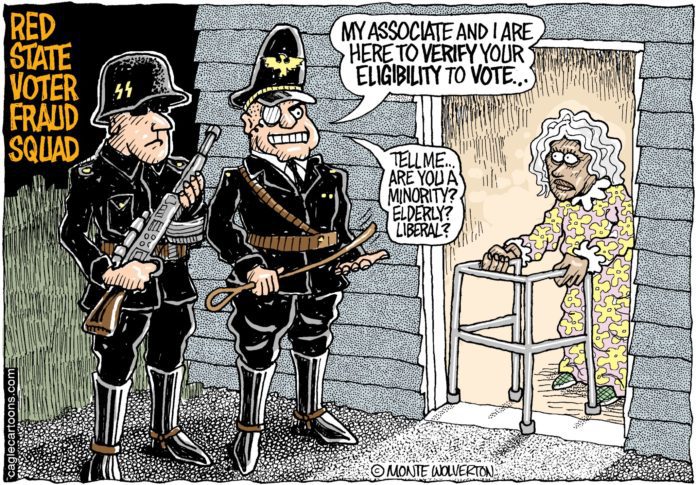BY DAVID PERRYMAN
 In the 1930’s when George and Ira Gershwin wrote the oft quoted lyrics to “Let’s Call the Whole Thing Off,” they were not only poking fun at regional dialect, but also class differences.
In the 1930’s when George and Ira Gershwin wrote the oft quoted lyrics to “Let’s Call the Whole Thing Off,” they were not only poking fun at regional dialect, but also class differences.
Somehow, blue-bloods who spoke ‘Toe-Mah-Toe, Poe-Tah-Toe and Bah-nah-nah” considered themselves superior to our grandparents who actually knew where tomatoes and potatoes came from.
Today, it is humorous when we hear Republicans insist that we live not in a democracy but a republic and Democrats simply maintain that ours is the greatest democracy in the history of the world. You may recall the 1960s commercial where the announcer interrupted two identically dressed young ladies who were arguing over whether Certs was a candy mint or a breath mint. He interjected, “Stop, you’re both right … Certs is two … two … two mints in one – with a sparkling drop of Retsyn.”
Regardless of party registration, we should all pause and consider that the first week of January 2014 marks the 225th anniversary of the election of George Washington as our country’s first president. Prior to 1789, we had no chief executive because the Articles of Confederation did not provide for an executive branch of government. A newly ratified Constitution changed all that and the deadline of January 7, 1789 was set for the Electoral College to convene for the selection of the first chief of the executive branch who was to be called president.
In 1789, the Constitution allowed each state to determine the process by which electors would be selected. Of the original 13 states, North Carolina and Rhode Island had not yet ratified the Constitution, and gridlock in New York prevented electors being sent from that state. Only six of the remaining 10 states used popular vote to democratically select their electors; elected representatives selected electors in the other four and, therefore, the question of democracy or republic remained.
One year later, the 1790 census showed a free population of 2.4 million and 600,000 slaves, but of the three million counted, only 1.3% of the population had cast a vote in the first presidential election.
Over the two and a quarter centuries since that first election, the right to vote has been greatly expanded. Poll Taxes are now illegal and property ownership is no longer a prerequisite to ballot access.
Constitutional protection of the right to vote came to African American males and others regardless of race, color or previous condition of servitude in 1870. Less than 100 years ago, all women [1919] finally gained that constitutional right of suffrage.
However, access to the ballot box is still being hampered. While it is imperative that voters be properly identified so that voter fraud can be eliminated, our current system does as much to promote voter fraud as it does to prevent it. Oklahoma law allows a person to vote with a “voter identification card” that is really not a card and does not actually identify the voter. The “card” is barely more than a slip of paper with a name, address and precinct number and it contains no photograph. With this slip of paper, an imposter would be allowed to vote.
Without the “card” the voter is required to present a government-issued photo identification card. For literally scores of reasons, there are displaced and homeless individuals with subsistence and survival priorities who are disenfranchised because their life circumstances do not allow them to maintain on their person sufficient documents to allow them to vote every couple of years.
Keeping track of a piece of paper pales in comparison to knowing where their next meal will come from or where they will be sleeping that night.
The majority of us don’t live that way, but we are kidding ourselves when we deny that truth. The goal of our state should be to facilitate legitimate voters and prevent fraud. A possible solution would be obtaining fingerprint scans when a citizen registers to vote.
Fingerprint scanners and readers are inexpensive and reliable identifiers in the absence of identification documents. Today all Oklahoma drivers have their fingerprints scanned at the tag office. Inexpensive fingerprint scanners are used in lieu of passwords on computers. Inmates are prevented from going through cafeteria lines twice by fingerprint scans. Many Oklahoma students’ lunch accounts are automatically debited by a fingerprint scan as they go through the school lunch line.
If our state’s goal is truly to prevent voter fraud and not disenfranchise citizens, this method of identification would be ideal – the state’s non-criminal fingerprint database is already protected from potential abuse. I am in the process of drafting language so that an economic impact can be obtained to determine if this method of identification would be a practical and feasible means of protecting the sanctity of the ballot box.
Like you, I love Oklahoma and would not want to live in a part of the country where a tomato is anything but a tomato and it would seem a shame to have fried po-tah-toes, but our absolute goal should be to eliminate all impediments to the ability of all citizens to vote in our “stop, you’re both right … representative democracy.”
– David Perryman, a Chickasha Democrat, represents District 56 in the Oklahoma House of Representatives







